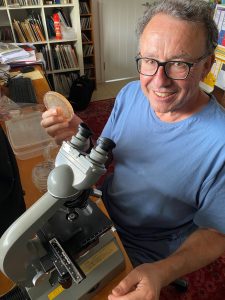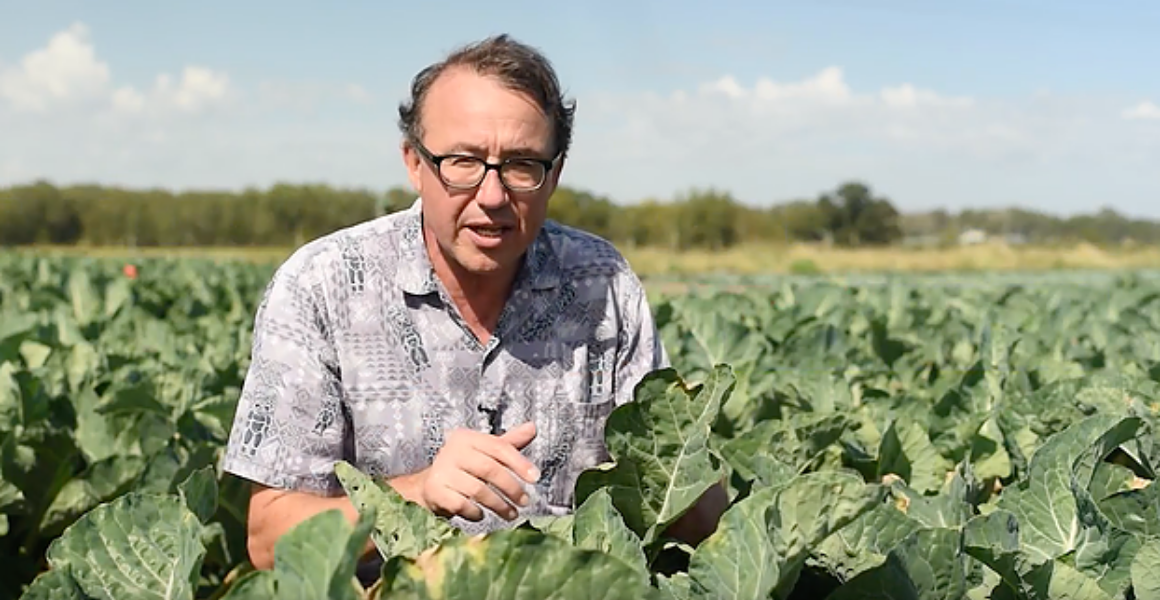Researcher of the Year award feature: Len Tesoriero
Dr Len Tesoriero
New South Wales
2010

Len Tesoriero’s career as a researcher identifying and managing vegetable crop diseases spans over four decades.
Len retired from the New South Wales Department of Primary Industries (NSW DPI) in 2017, but is continuing to work as a consultant through his company, Crop Doc Consulting Ltd. He is actively working on various horticulture projects with key R&D providers – government and private sector – and is a Visiting Fellow with the NSW DPI. Len is also passing on his extensive knowledge and expertise to others through his mentorship of several early- and mid-career plant pathologists.
Len was recognised for his tireless dedication and significant contribution to the Australian horticulture industry at the 2010 National Horticulture Convention when he received the Researcher of the Year award, sponsored by Bayer CropScience.
Gaining knowledge
Len started his career in the early 1980s at a large research institute run by NSW Department of Agriculture in Western Sydney, the Biological and Chemical Research Institute. He was working as a technician for a vegetable crop pathologist.
“It held a wealth of human capital in plant pathology, entomology, and chemistry. It was a fantastic place to learn from a range of experts and I’ve always acknowledged the importance of mentoring,” Len says.
During that time, Len was encouraged to undertake further studies to attain a Master of Science (MSc) and PhD. Although most of Len’s research has been vegetable-related, his MSc was in on Pythium root rot of cereal crops. This same group of pathogens cause important losses in vegetables.
Industry collaboration
Since 2010, Len has been keeping busy working on several projects – with the NSW DPI before formally retiring, and since as a contractor. His final project working with the NSW DPI was leading the project Effective management of parsley summer root rot (VG13101), a strategic levy investment under the Hort Innovation Vegetable Fund.
Since retiring, Len has worked on a number of vegetable levy investments with project partners.
He has assisted Applied Horticulture Research (AHR) and RM Consulting Group with A multi-faceted approach to soilborne disease management (VG15010) and Soil wealth and integrated crop protection – phase 2 (VG16078); Area wide management of vegetable diseases: viruses and bacteria (VG16086), with the Queensland Department of Agriculture and Fisheries and NSW DPI; Improved management of pumpkin brown etch (VG15064) and Internal fruit rot of capsicum (VG17012) with AHR; and a review of the causes of potato bacterial soft rots and blackleg that included relevance to other horticultural commodities.
The capsicum and area wide management projects are in the final stages of completion.
“Unfortunately, progress and extension activities in both have been affected by the current pandemic,” Len says.
“But I’m also assisting on a disease project for the almond industry project with Agriculture Victoria and The South Australian Research and Development Institute, and and have been doing some work for pistachio growers.”
Dedication to research
While he is coming to the end of his career, Len’s still passionate about plant pathology.
“From the moment I first looked at plant pathogens down a microscope, I was fascinated by their diversity and intrinsic beauty – despite their destructive nature,” Len says.
“I also really enjoy meeting growers and seeing how and where vegetables are grown across Australia.”
When asked about those projects that he’s worked on and what can be built upon, Len points to soilborne disease management.
“The soilborne disease project is one where I think more work will add significant value, as we only had limited opportunities to demonstrate benefits of integrated disease management strategies,” he says.
“I think there needs to be a focus on further studies for optimising soil health interventions, such as cover crops, rotations with the use of microbial biocontrols and conventional agrichemicals.”
There will always be a need for more pest and disease management research as things are always changing, Len says.
“New pests and diseases are arriving to our shores, and they develop resistance to our agrichemicals; and our weather patterns are likely to change, which will affect how plants grow and their relationships with their microbial communities.”
Len would like to see further emphasis on an integrated or holistic view of disease management – using those aforementioned interventions, but also including other factors that influence plant health such as plant nutrition.
“I like the farm demonstration approach used in the Soil Wealth project. I also have a strong interest in protected cropping – both from a strategic food security viewpoint and as a viable peri-urban land use which could integrate several aspects of a circular economy,” he says.
The final word
Upon reflection, Len says it was a great honour to receive the 2010 Researcher of the Year award.
“I’m extremely grateful for the recognition, especially since there were several deserving nominees. I was humbled to have been given the award,” he says.
“I’m grateful to have had a career working with such a fabulous industry and people.”
About the award
The Bayer Researcher of the Year award recognises a leading agricultural researcher who has helped to advance the industry through their work, and actively encourages growers to implement research outcomes on-farm. Award nominations are now open, closing on 15 April. Click here for further details.

